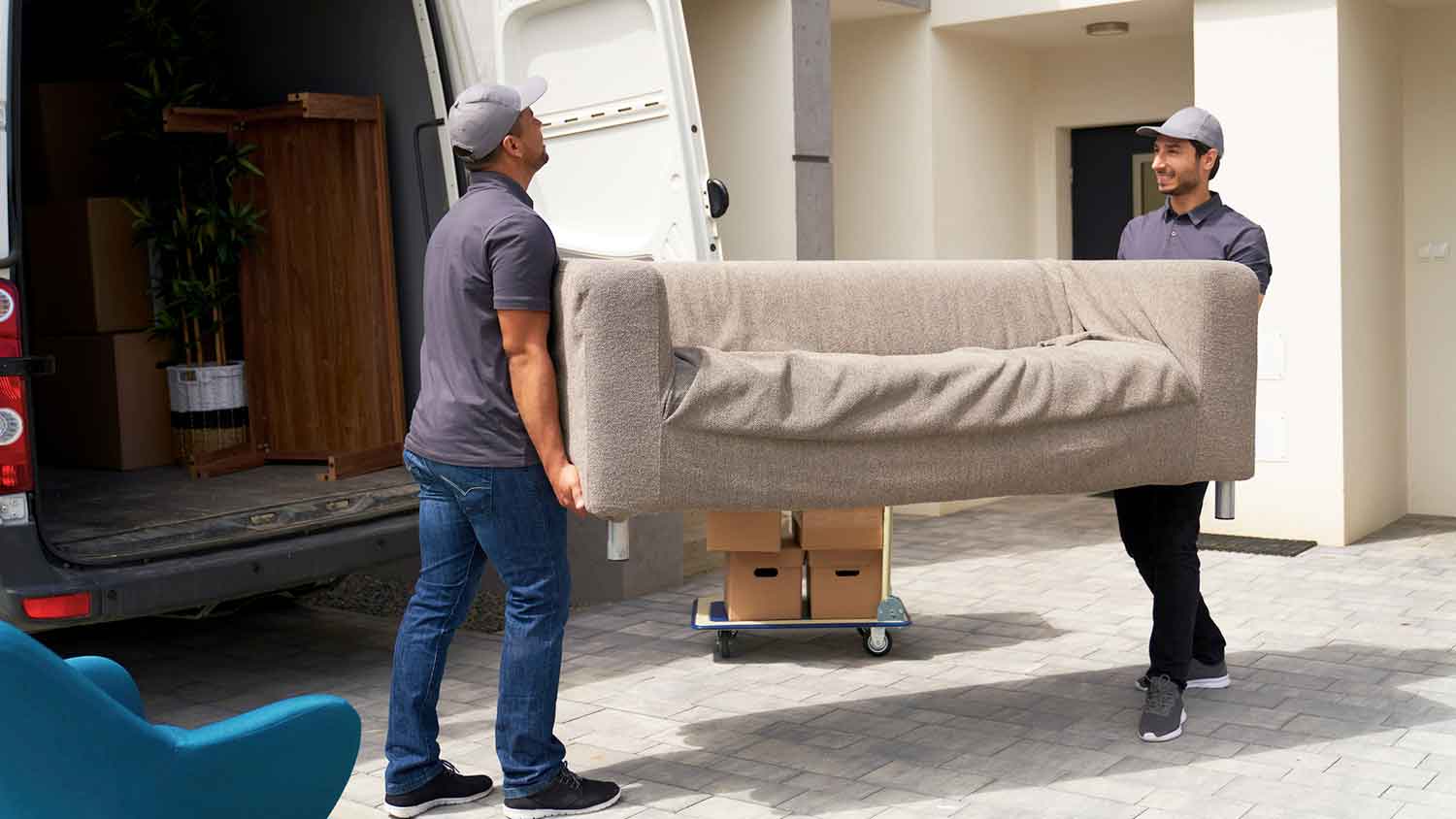How to Dispose of a Refrigerator Properly
There are more options than just sending it to a landfill


If your refrigerator has come to the end of its life, or it’s time for an upgrade, you now need to figure out what to do with the old one. If you’ve never disposed of a refrigerator, it may surprise you to know you can’t simply unplug it and set it by the curb for trash pickup. Disposing of a refrigerator is a little more complicated, but fortunately, there are plenty of options for getting rid of a fridge safely and affordably.
Why It’s Important to Properly Dispose of an Old Refrigerator
To cool your food and keep it at a safe temperature, refrigerators make use of refrigerant—usually HFC-134a, also called 1,1,1,2-tetrafluoromethane. It’s better for the environment than outdated refrigerants like chlorofluorocarbons (CFCs) but still has a high potential to degrade the ozone layer of the earth’s atmosphere, according to the Environmental Protection Agency (EPA).
Disposing of refrigerant properly, which usually involves recapturing it for use in newer refrigerators, is crucial if you want to minimize your negative impact on the environment.
Refrigerators also contain materials that are easily recyclable, like glass, metal, and some plastics, but only if you dispose of the appliance properly. Older refrigerators may include switches that contain mercury and insulation foam that contains ozone-depleting substances (ODS).

Prepping to Remove a Refrigerator
Regardless of how you dispose of your refrigerator, there are a few things you should always do beforehand:
Unplug it early. It’s a good idea to unplug the old refrigerator a few days before the scheduled haul away so the fan motor has plenty of time to cool down and so that your freezer can defrost and drain.
Clean it out. Remove any food or other items placed inside the refrigerator. This is especially important if you’re having the materials recycled.
Remove the doors. If your fridge will be at the curb for any amount of time, removing the doors will prevent children from getting trapped inside if they decide to play in it. This is often a legal requirement for this reason. It will also prevent the doors from swinging open during transportation.
Tape the glass shelves. Placing tape in an X shape over each pane of glass will help prevent the glass from shattering into tiny pieces during transportation.
Leave the refrigerant for professionals. When it comes to the compressor and any metal tubing in or on the fridge, don’t remove those yourself. They likely contain hazardous refrigerants and demand professional attention.
How to Dispose of a Refrigerator 7 Ways

Refrigerators are bulky and heavy, which makes disposing of them a challenge. Not to mention, placing them on the curb for regular trash pickup is rarely an option. Fortunately, there are multiple safe (but still convenient) ways to dispose of a refrigerator.
Ask a Retailer for Haul Away
If you’re purchasing a refrigerator from an appliance retailer, most offer an appliance haul-away service for your old unit, and some offer it at no additional cost. This not only saves you time and your back from a potential strain, but retailers also refurbish or recycle the refrigerators, including the proper disposing of the compressor and refrigerants. If you choose this route, you can ask the retailer what happens to the old refrigerator so that you know you’re doing right by the environment.
Even if you don’t purchase a brand new refrigerator from a retailer, you can call a retailer and inquire if they offer an appliance recycling program to anyone who wants to drop off their old refrigerator. You might have to transport the fridge yourself, though, unless you’re willing to pay a flat fee for them to pick it up. The fee will often depend on the size of your refrigerator.
Contact Your Electric Company
A growing number of utility companies offer refrigerator recycling services. Some of them even offer rebates throughout the year for the purchase of a newer, more energy-efficient refrigerator if you recycle your old one, or they may offer a credit on your utility bill. It’s worth a phone call to your utility company to find out if any of these programs are in your area.
Look into the RAD Program
The EPA created the Responsible Appliance Disposal, or RAD, program, which connects consumers with various partners throughout the country set up for proper refrigeration recycling. Simply put in your zip code, and the EPA’s site directs you to the partners nearest you. Once connected, some places do charge small fees, but you can be assured the partner will dispose of and recycle your refrigerator properly.
Call Your Local Waste Management or a Junk Removal Service
The local waste management company or municipality that takes care of your regular trash pickup will very likely offer a bulk or heavy item pickup date or may offer further guidance on the safe removal of your old refrigerator. Sometimes, they charge additional fees, but most allow you to schedule for bulk pickup routinely at no additional cost. The EPA requires compliance and adherence to its regulations for waste disposal companies, so this is another safe option for refrigerator disposal.
You can also call a local appliance removal service, which is a company that specializes in removing unwanted, bulky appliances from your home and hauling them away. They typically charge per project, so getting a quote ahead of time is a good idea. The benefit of paying a professional is that they’ll typically pick up your fridge from inside, so you don’t have to move it at all, and many will ensure proper recycling and landfilling.
The cost of appliance removal is often between $50 and $150, so while this is a more costly option than most others, it is worth it for the convenience.
Consider a Local Scrap Metal Recycler
If your community has a local scrap metal recycler, then you can call and ask about recycling an old refrigerator. Not only will a metal recycler properly dispose of your appliance, but you also might get paid a few dollars for the metal.
You might need to take out and dispose of certain components yourself, like the doors, shelves, and drawers. Keep in mind that you’ll need to haul the refrigerator to the scrapyard yourself.
Try Selling it Online
Most refrigerators last between 10 and 15 years, which means there may be plenty of time left in your refrigerator’s life. Unless there are signs your refrigerator is dying, you can try selling it online through a digital marketplace. Selling a used refrigerator still in great working order can make you a little extra money, and it can help someone else save on the (sometimes enormous) cost of a brand-new refrigerator.
To keep things convenient, list your old fridge as local pickup only. That way, you don’t have to worry about transporting it.
Donate the Old Refrigerator
If there’s still life left in your refrigerator, but you’re not interested in selling it, you can donate it. You can start by asking any friends or family members who know of someone in need, perhaps someone furnishing their first apartment.
You may have a neighbor who would like an extra refrigerator for their garage or basement that would be glad to take it off your hands. You can also call around to any local charitable organizations or schools and see if there’s a need within the community.
Depending on who takes your old fridge, you might need to haul it yourself, so keep that in mind when offering it to others.
Tips for Disposing of an Old Refrigerator

Disposing of an old refrigerator can be a lot of work, especially if the method you choose involves hauling it yourself. Use the following tips to make your life a little easier:
Remove all accessories. Start by taking off the doors, removing the drawers, and taking out the shelves. Doing so will reduce the weight of the appliance, making it easier to move.
Plan your route. Before you start moving your fridge, plan the entire route from where it sits to where you need to move it. Take measurements of doorways if necessary to make sure it will fit through wall openings.
Use a dolly. Refrigerators are heavy and awkward, which makes moving them—even just a short distance—a potential for a strained back or worse. A dolly helps reduce the risk of injury.
Load your fridge backward. If you’re using a dolly or hand truck, walk backward up the ramp and pull the appliance rather than getting behind it and pushing. This will keep you safe in case you lose your grip.
Sara Coleman contributed to this piece.
Frequently Asked Questions
If you’re storing a refrigerator in an unheated space, appliance manufacturers recommend removing all food and items and keeping it unplugged. Additionally, make sure there is no water supply and the icemaker is set to off. After cleaning the interior, you can place a box of baking soda inside and keep the doors propped open so no mold or mildew grows.
Most municipal or waste management companies do not allow you to put out a refrigerator for regular trash pickup. You can, however, call your waste management company and ask about the proper steps for “special” or bulk pickup (if it’s offered) or information about local community programs offering refrigerator recycling.
Whether or not it’s worth repairing a broken fridge depends on its age and the type of repair you need. If your damaged component is still under warranty, it’s absolutely worth repairing, as the repair likely won’t cost you anything. If the fridge is nearing the end of its life, it’s likely not going to be worth repairing, as you’ll have to replace it soon anyway. The average cost of refrigerator repair is around $250, so if your fridge has a few years of life left, repairing it is probably worthwhile, but more costly repairs might not be.





- 11 Signs Your Refrigerator is Dying and Potential Solutions
- Refrigerator Constantly Running: Reasons and Solutions
- 10 Ways to Make Your Refrigerator More Efficient
- Why is My Refrigerator Not Cooling? Key Reasons
- Who Fixes Refrigerators? Who to Call to Fix Your Fridge
- Cleaning Refrigerator Condenser Coils Saves Money
- How to Dispose of Appliances Properly
- Top 12 Refrigerator Maintenance Tips
- Why Is My Fridge Leaking?
- Key Reasons Why Your Fridge Freezes Everything










